VIPsight - 3rd Edition 2016
COMPANIES
Deutsche Bank is closing 200 branches
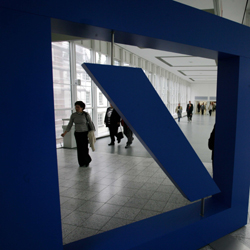 Deutsche Bank has incurred a loss of almost half a billion euros as a result of fraudulent share trading. According to its annual report, Germany's largest bank increased its provisions for "external fraud" to EUR 475 million euros in 2015 from EUR 20 million in 2014. A spokesman declined to say what event or events the charge related to or when it occurred.
Deutsche Bank has incurred a loss of almost half a billion euros as a result of fraudulent share trading. According to its annual report, Germany's largest bank increased its provisions for "external fraud" to EUR 475 million euros in 2015 from EUR 20 million in 2014. A spokesman declined to say what event or events the charge related to or when it occurred.
The bank is also to cut 3000 full-time positions at 200 branches. This is practically one quarter of all its branches in Germany. These measures will be taken after agreement was reached with the bank's works council. Around 2500 of the 3000 job losses will affect the private and commercial banking unit. Deutsche Bank is focusing on the expansion of its digital services. There are also plans for a further 1000 job reductions in other business and infrastructure units. "Our objective is to avoid compulsory redundancies," the bank said in its statement. Most of the job cuts are expected to be made in large cities.
Airbus overtakes Boeing
The Farnborough Airshow marked an end to the order boom for the major aircraft makers. During the event the European manufacturer Airbus outstripped its US rival Boeing in terms of new orders, and is therefore again leading the way so far this year. Airbus' Chief Operating Officer John Leahy conceded, however, that his goal of from 650 to 700 new orders for 2016 was on the ambitious side. At the trade fair near London Airbus disclosed orders and commitments for 279 commercial aircraft worth around USD 35 billion at list prices. Of this total, 197 are firm new deals. Boeing secured commitments for 140 aircraft worth USD 22.4 billion, including 20 firm orders.
Shoes from the Speedfactory
 Adidas's classified pilot project is being carried out in a separate, restricted access facility in Ansbach belonging to its partner Oechsler, a plastics producer and automotive industry supplier. The first 500 pairs of running footwear are scheduled to be produced as prototypes in this plant in the autumn. They will not be for sale as the quantity is so small and are solely for marketing purposes. Large-scale production at a 4600-m² factory in the central Franconian town of Ansbach, which will have an annual output of half a million pairs of footwear, will commence in 2017. Speedfactory is the name given by Adidas to this production concept, which is expected to gain in importance over the coming years. "We are revolutionising our industry," remarked Herbert Hainer, who steps down as CEO of Adidas in September, at a recent event in Ansbach.
Adidas's classified pilot project is being carried out in a separate, restricted access facility in Ansbach belonging to its partner Oechsler, a plastics producer and automotive industry supplier. The first 500 pairs of running footwear are scheduled to be produced as prototypes in this plant in the autumn. They will not be for sale as the quantity is so small and are solely for marketing purposes. Large-scale production at a 4600-m² factory in the central Franconian town of Ansbach, which will have an annual output of half a million pairs of footwear, will commence in 2017. Speedfactory is the name given by Adidas to this production concept, which is expected to gain in importance over the coming years. "We are revolutionising our industry," remarked Herbert Hainer, who steps down as CEO of Adidas in September, at a recent event in Ansbach.
Wirecard has a new niche
Wirecard has conquered a new niche. In tandem with the software developer AMETRAS the company has developed a payment app for the furniture and furnishings store Inhofer. This development undoubtedly also has the potential to attract other customers. The payment app offers a practical solution to Inhofer customers, who can pay a small deposit for their goods immediately upon purchase and use the technology to settle the remaining balance upon delivery. Payment is made using a smartphone and a card reader by credit card or direct debit.
MTU Aero Engines: orders worth over EUR 1 billion
The engine manufacturer MTU Aero Engines secured EUR 1.1 billion in orders at the Farnborough Air Show. "Geared turbofan technology continues to be in very high demand among airlines," said MTU's CEO Reiner Winkler today. According to Winkler, with its high market share in programmes for short- and medium-range aircraft as well as regional and business jets, MTU also stands to benefit from the aftermarket business.
Deutz running great
The three millionth engine has come off the production line at Deutz’s main factory in Cologne, another milestone in the long history of the engine maker. Just last year, DEUTZ notched up the nine millionth engine to be built worldwide since the Company was founded more than 150 years ago. DEUTZ opened a new engine plant in Cologne-Porz in June 1993 that was among the most cutting edge of its kind in the world. Today, Cologne-Porz is home to DEUTZ's most important assembly plant worldwide and the Company's headquarters. A few weeks ago, DEUTX commenced production of camshafts and crankshafts in a new shaft centre at this site.
Today, DEUTZ is one of the world's leading independent engine manufacturers and employs around 3,700 people.
The German Mittelstand
Inheritance tax reform will have a major impact on smaller SMEs
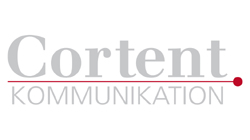
In early July, the Federal Government called a halt to the process of inheritance tax reform that had been so widely debated by SME associations and lobbyists, making radical change seem increasingly remote. The draft bill on SME company inheritance is expected to maintain the same special provision as presently in force. Proprietors who manage their own companies for at least five years, or do so by probate and satisfy certain other conditions have the right to an 85 percent inheritance tax rebate. After seven years and a fixed wage bill, the company’s inheritance tax liability is nil.
On the one hand the Family Business Foundation views the proposal as a major step in the right direction compared to the first draft bill of January 2015, while the Chairman of the Federal Association of SME-generated Economy (Budnesverband mittelständische Wirtschaft – BVMW), Mario Ohoven, is strongly opposed to it. “The compromise struck among the parties of the governing coalition runs counter to the interests of German SMEs.“ At first sight, that doesn’t seem to ring true being that the governing coalition’s aim is not only to improve taxation fairness but also to maintain employment levels and to stop the haemorrhage of companies and entrepreneurs. This is why the fiscal benefits for whoever inherits a company should be withheld until a set period of time has passed. As it stands, legislation is meant to orient company management towards more long-term strategies.
The draft bill, therefore, is only felt as being harsh by the many who inherit small companies. The problem is that up to now, inheritors of companies with fewer than 20 employees were exempt from submitting documentation attesting to due dates and wage bills but this exemption will now only apply to companies with staff of fewer than five. This, apparently minor amendment is reportedly causing major headaches. According to the SME Institute in Bonn, there are some 3.24 million very small companies – 89.3 percent of up to all registered companies, which, by definition can have 9 staff and post a turnover of up 2 million Euros.
The brunt of the new law is again borne by small companies who are finding it proportionately much harder to meet due dates and wage bills and their size or lack thereof makes them susceptible to market peaks and troughs. When the will to carry on the business dwindles and fades, finding an external manager becomes a costly enterprise especially one willing to accept the challenge and possess the skills to make it a success.
The legislator has reached a point that calls for reflection on whether legislation with self-defeating objectives is being put in place.
Start-ups, make an indispensible contribution towards strengthening the nation’s economy and fostering its thrust in innovation, and the small enterprises especially deserve greater consideration. It remains to be seen whether the issue will be tabled for negotiation very small companies have no lobbying clout.
Buhlmann's Corner
Wishful thinking and reality – ‘The Proposition’
 This is about a film – ‘The Proposition’ (its German title - Wunsch und Wirklichkeit – translates as Wishful Thinking and Reality) a true-to-life depiction of the state of Corporate Governance and shareholder AGMs.
This is about a film – ‘The Proposition’ (its German title - Wunsch und Wirklichkeit – translates as Wishful Thinking and Reality) a true-to-life depiction of the state of Corporate Governance and shareholder AGMs.
Just like the film set in Boston, the founders and shareholders Larry Page and Sergey Brin find themselves in love with partners who are impotent. The co-shareholders possess A, B and C type shares without voting rights and all this (nomen est omen) in a parent company called “Alphabet” a multi-layer concern where never is heard the slogan ‘one share one vote’ so often yelled by activists at corporate governance conventions. Hi-tech concerns like Linkedin and Yelb, or groups such as Comcast and Discovery, or Volkswagen and Facebook all have that in common – grab the shareholders by the purse strings and deny them voting rights.
Everything is fine and hunky dorey provided the money keeps rolling in but then major Snafus take centre stage as soon as ethics become conspicuous by their absence and corporate governance practice is brought to its knees. One example, nothing short of sensational, was Volkswagen with its dictatorial leadership. The autocrat kept the actor at arms-length, the world-class swindle became an astronomical sum of money and, to cap it all, who got appointed to chair the Supervisory Board with the task of investigating what really happened? Why, none other than Hans Dieter Pötsch former treasurer and head of company communication policies. Nobody seems to be at all phased by the idea.
The AGM certified by an almost plebiscitary vote that everyone discharged their duties. Doesn’t anybody realise that deliberate abstention is not a vote for anything at all but just a non-participation in the vote regardless of whether you’re physically present or not. Are we absolutely sure that this doesn’t bother anyone at all? The fact remains that nobody seems to have noticed that the VW website gives the number of those present at the vote as 276,482,699 shares with voting rights, 277,355,828 of whom voted ‘Yes’ for the second item on the agenda. It stands to reason, the absentees also voted on the matter of the dividend.
Ought I be concerned when an abstention is not considered as a vote but a non-presence? If everyone was clear on the matter then probably not. But, I ask myself, why should the question even arise? So that an imaginary electronic count be held of the ‘NO’ votes not yet cast to make the percentage of approval look better?
Ought I be concerned because practically no voting shareholder ever makes sure that his vote cast gets on board and put to its intended use? History shows that concern ends at the ballot box at the journey’s very departure point. As anyone interested in voting rights can tell, by and large only ‘yes’ votes tend to make it home.
The remuneration system, not only of Deutsche Bank, but also of Renault, and in London of BP was rejected. When you want to, you can. All the rest is chatter, although it is also true that since being quoted on the stock market, certain German companies like Henkel and Merck are having to come to terms with rules that hinder voting rights – but behind the scenes the founding family acts as the ethical representative of shareholders as regards corporate governance. But then again, that ain’t necessarily so, as Haniel, Volkswagen and company show.
The dot on the ‘i’ of capitalism is called Apple; saved from bankruptcy by Bill Gates, father of Microsoft, with a pittance (150 million US$) it grew to be the most expensive boutique on the planet. For years, preference shares defended it against the AGM majority. Carl Icahn a great man is no longer there. And if Carl Icahn sees the risks in the ETF (Exchange Trades Funds), then these risks are real, even though the strength and power of an activist like Icahn grows as the number of shareholders who vote at AGMs diminishes. Indeed, during the Deutscher Corporate Governance Kodex conference, an ETF like Black Rock even went so far as to suggest that AGMs should be abolished. That, for me is just a self-fulfilling prophecy. You start by not going yourself, then you suggest doing away with it altogether, like the priest who firstly conceives a child so that by making a donation he gets out of being posted to Rome. And on the subject of Rome, even the Vatican is beginning to murmur about corporate governance. Clemens Börsig (ex-CFO and chair of DeutscheBank – like Pötsch in VW) left the IOR early. Does that mean that Pope Francis has an inside track to higher causes? Now, the question is should he have multiple voting rights as they have in France for shareholders with seniority. Or why not give all non-Catholics the non voting right to participate?
Aktiengesellschaft June 22, 2016 |
ACTIONS CORNER
Politics
Post boss proposes robot tax
 Deutsche Post CEO Frank Appel has proposed the levying of a robot tax to boost public budgets. "Work done by people, for example, could be exempted from VAT – with taxation restricted to work performed by robots," Appel informed the press. "It's a proposal that at least merits consideration," he said, pointing out that "groceries also receive preferential treatment when it comes to the levying of VAT." A study by the consulting firm PWC and the Darmstadt-based economic research institute Wifor, however, concludes that the demographic labour shortage in Germany cannot be fully addressed with robots. According to the study, robots will only be able to make up for two million of a potential shortage of four million workers.
Deutsche Post CEO Frank Appel has proposed the levying of a robot tax to boost public budgets. "Work done by people, for example, could be exempted from VAT – with taxation restricted to work performed by robots," Appel informed the press. "It's a proposal that at least merits consideration," he said, pointing out that "groceries also receive preferential treatment when it comes to the levying of VAT." A study by the consulting firm PWC and the Darmstadt-based economic research institute Wifor, however, concludes that the demographic labour shortage in Germany cannot be fully addressed with robots. According to the study, robots will only be able to make up for two million of a potential shortage of four million workers.
People
Melanie Kreis in Management Board of Deutsche Post
 A woman will now be responsible for finances on the Board of Deutsche Post. The company has announced the appointment by the Supervisory Board of 45-year-old Melanie Kreis as the successor to Lawrence Rosen. According to Fidar, the German organisation campaigning to get more women onto supervisory boards, just under ten per cent of top management positions in Dax companies are held by women. The previous Chief Financial Officer of Deutsche Post, who held the position for over seven years, announced that he was stepping down for private reasons.
A woman will now be responsible for finances on the Board of Deutsche Post. The company has announced the appointment by the Supervisory Board of 45-year-old Melanie Kreis as the successor to Lawrence Rosen. According to Fidar, the German organisation campaigning to get more women onto supervisory boards, just under ten per cent of top management positions in Dax companies are held by women. The previous Chief Financial Officer of Deutsche Post, who held the position for over seven years, announced that he was stepping down for private reasons.
Lufthansa, by contrast, is losing its Chief Financial Officer, Simone Menne. In a statement the company announced that the 55-year-old has requested an early termination of her contract with effect from 31 August. The graduate in business administration had worked her way up at Lufthansa since 1989 and on 1 July, 2012 became the company's first ever female Chief Financial Officer.
An increase in the percentage of women on DAX supervisory boards
 An increasing number of women are being appointed to the supervisory boards of German public limited companies. Nonetheless, the figure remains some way short of the legally required ratio of 30%, according to the auditing and consulting firm PWC in Frankfurt. According to PWC, since 2011 the ratio of women on the supervisory boards of the 30 companies listed on the DAX index of leading German companies has risen by ten percentage points to 23.4 per cent. With voluntary commitments having proved ineffective, the German government is now seeking to make the upper echelons of German industry more female by law. From 2016 the supervisory boards of listed companies are expected to have a female to male ratio of 30 per cent. At present this 30 per cent mark is exceeded by ten of the 30 DAX companies – with half achieving a ratio of 20 per cent at the most. According to the PWC survey, the consumer goods maker Henkel currently has the highest ratio, with women occupying 7 of 16 positions on its supervisory board. Munich Re has 8 female supervisory board members of a total of 20, with Deutsche Bank and Deutsche Lufthansa each reporting seven female members on their 20-strong boards. Fresenius SE and Fresenius Medical Care have no female supervisory board members.
An increasing number of women are being appointed to the supervisory boards of German public limited companies. Nonetheless, the figure remains some way short of the legally required ratio of 30%, according to the auditing and consulting firm PWC in Frankfurt. According to PWC, since 2011 the ratio of women on the supervisory boards of the 30 companies listed on the DAX index of leading German companies has risen by ten percentage points to 23.4 per cent. With voluntary commitments having proved ineffective, the German government is now seeking to make the upper echelons of German industry more female by law. From 2016 the supervisory boards of listed companies are expected to have a female to male ratio of 30 per cent. At present this 30 per cent mark is exceeded by ten of the 30 DAX companies – with half achieving a ratio of 20 per cent at the most. According to the PWC survey, the consumer goods maker Henkel currently has the highest ratio, with women occupying 7 of 16 positions on its supervisory board. Munich Re has 8 female supervisory board members of a total of 20, with Deutsche Bank and Deutsche Lufthansa each reporting seven female members on their 20-strong boards. Fresenius SE and Fresenius Medical Care have no female supervisory board members.
Everyone loves Caparros
Alain Caparros, CEO of Rewe, is Germany's most popular boss, according to the job and career community Glassdoor. The portal identified the ten highest rated CEOs based on the input of employees who voluntarily provide anonymous feedback on its site. In second and third places were Harald Krüger of BMW and Mark Weinberger of Ernst & Young. The Employees' Choice Awards were conferred for the second time.
Campus
Capital News
Daimler posts a sharp increase
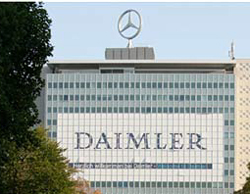 Daimler AG has released its interim results for the second quarter of 2016. There was a particular focus on the company's EBIT performance. Group EBIT adjusted for special reporting items rose to EUR 3.98 billion from EUR 3.76 billion in the same period of 2015. At the Mercedes-Benz Cars division, however, EBIT eased from EUR 2.23 billion to EUR 2.2 billion. At Daimler Trucks EBIT fell from EUR 717 million to EUR 661 million, while Mercedes-Benz Vans posted an increase to EUR 462 million from EUR 238 million under this heading. At Daimler Buses EBIT improved from EUR 57 million to EUR 89 million. Daimler Financial Services posted a slight rise from EUR 445 million to EUR 479 million, while reconciliation EBIT was unchanged at EUR 73 million.
Daimler AG has released its interim results for the second quarter of 2016. There was a particular focus on the company's EBIT performance. Group EBIT adjusted for special reporting items rose to EUR 3.98 billion from EUR 3.76 billion in the same period of 2015. At the Mercedes-Benz Cars division, however, EBIT eased from EUR 2.23 billion to EUR 2.2 billion. At Daimler Trucks EBIT fell from EUR 717 million to EUR 661 million, while Mercedes-Benz Vans posted an increase to EUR 462 million from EUR 238 million under this heading. At Daimler Buses EBIT improved from EUR 57 million to EUR 89 million. Daimler Financial Services posted a slight rise from EUR 445 million to EUR 479 million, while reconciliation EBIT was unchanged at EUR 73 million.
Wacker Chemie: strong growth prospects
 Peter Spengler, an analyst at DZ BANK, again issued a SELL recommendation for the specialty chemical firm Wacker Chemie AG in his latest report but reduced its fair value from EUR 101 to EUR 94. According to Spengler, the Munich-based company's polysilicon business is still in a transitional phase due to depressed prices and low utilisation in the US. Spengler advises investors to factor in the company's good growth prospects from 2017, however, and to take positions accordingly. With subsidiaries and sales offices in 28 countries, Wacker is active in the US, Asia, Australia and Europe.
Peter Spengler, an analyst at DZ BANK, again issued a SELL recommendation for the specialty chemical firm Wacker Chemie AG in his latest report but reduced its fair value from EUR 101 to EUR 94. According to Spengler, the Munich-based company's polysilicon business is still in a transitional phase due to depressed prices and low utilisation in the US. Spengler advises investors to factor in the company's good growth prospects from 2017, however, and to take positions accordingly. With subsidiaries and sales offices in 28 countries, Wacker is active in the US, Asia, Australia and Europe.
Still no dividend at Zalando
Zalando, Europa's largest online fashion retailer, will continue to refrain from paying a dividend. "We are likely to continue to invest our profits in growth in the coming years," announced Management Board Member Rubin Ritter at the company's Annual General Meeting. Zalando has been listed on the stock market since autumn 2014 and was added to the mid-cap MDAX index in 2015.
Deutsche Telekom saves a billion
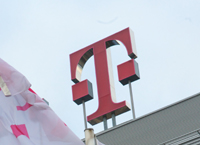 The decision of many shareholders not to take a cash dividend has enabled Deutsche Telekom to make a EUR one billion saving. Investors holding 40.9 per cent of Deutsche Telekom opted for a dividend payment in shares instead of cash this year. Last year, however, the proportion of shareholders opting for a dividend payment in shares was even greater at 49 per cent. The dividend of 55 cents per share for 2015 will entail a total outlay of EUR 1.49 billion in cash. For 26.7 old shares shareholders now receive one free share - at the current share price of EUR 14.56 this is worth 55 cents. The issue of a total of 70 million new shares increases the company's subscribed capital by 1.5 per cent.
The decision of many shareholders not to take a cash dividend has enabled Deutsche Telekom to make a EUR one billion saving. Investors holding 40.9 per cent of Deutsche Telekom opted for a dividend payment in shares instead of cash this year. Last year, however, the proportion of shareholders opting for a dividend payment in shares was even greater at 49 per cent. The dividend of 55 cents per share for 2015 will entail a total outlay of EUR 1.49 billion in cash. For 26.7 old shares shareholders now receive one free share - at the current share price of EUR 14.56 this is worth 55 cents. The issue of a total of 70 million new shares increases the company's subscribed capital by 1.5 per cent.
RTL increasing strongly
RTL posted improved earnings for the first quarter of 2016, driven by its broadcast business and production arm. Reported Group revenue rose by 9.5 per cent to EUR 1.430 billion. Reported EBITA was up by 18 per cent at EUR 229 million while net profit attributable to RTL Group shareholders grew by 30 per cent to EUR 138 million. The beneficiary was Bertelsmann, which owns 75% of RTL. The media group's operating profit grew by eight per cent to EUR 500 million while its net profit climbed 30 per cent to EUR 185 million.
Thyssenkrupp with huge drop in sales and profits
Thyssenkrupp reported a first-half profit of EUR 37 million, down 62 per cent year on year. Its sales fell by eight percent to EUR 19.4 billion.
Krones has grown
Krones AG has held its 36th Annual General Shareholders' Meeting in Neutraubling. Representation of the company’s share capital at the meeting came to around 83%.
Executive Board Chairman Christoph Klenk and Chief Financial Officer Michael Andersen reported to the shareholders present on a very successful 2015 financial year overall. Krones achieved all key financial performance indicators last year and posted further profitable growth. The outlook for the current financial year is also positive overall. Revenue is expected to advance by 3% in 2016, with Krones targeting a repeat of last year's EBT margin of 7%. The Executive Board and the Supervisory Board proposed to the Annual Shareholders’ Meeting a dividend of EUR 1.45 per share for the 2015 financial year, EUR 0.20 higher than last year, to distribute an appropriate portion of profits to shareholders. The Meeting approved the proposal by a large majority. The payout corresponds to 29% of consolidated net income for 2015 and is therefore at the upper end of the target corridor of 25% to 30%.
The reappointments of Philipp Graf von und zu Lerchenfeld, Norman Kronseder and Hans-Jürgen Thaus as Supervisory Board Members were approved by the Annual Shareholders' Meeting. The company's shareholders also approved the appointment of Prof. Dr. Susanne Nonnast as a new Supervisory Board Member. This law graduate, a Professor at the East Bavarian University of Applied Science in Regensburg, is the second woman, after Petra Schadeberg-Herrmann, to represent shareholders on Krones’ Supervisory Board.
In addition, the AGM elected Volker Kronseder to the Supervisory Board. From 1996 to the end of 2015, Volker Kronseder was the company’s Executive Board Chairman, and he will continue to exercise responsibility at Krones AG on the Supervisory Board.
Heidelberger achieves turnaround
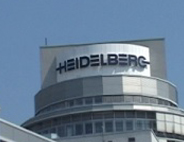 Heidelberger Druckmaschinen AG achieved a EUR 100 million turnaround in its result – from €-72 million to €28 million – in its 2015-2016 financial year (1 April 2015 to 31 March 2016). The company therefore attained its target of a significant increase in annual net profit. Its performance shows that the company's strategic reorientation is having an effect.
Heidelberger Druckmaschinen AG achieved a EUR 100 million turnaround in its result – from €-72 million to €28 million – in its 2015-2016 financial year (1 April 2015 to 31 March 2016). The company therefore attained its target of a significant increase in annual net profit. Its performance shows that the company's strategic reorientation is having an effect.
"Heidelberg is once again making profits and looking ahead with confidence," said CEO Gerold Linzbach. "The last financial year marks a turning point in our strategic reorientation process”.
Sales increased to EUR 2.512 billion in 2015-2016 (previous year: EUR 2.334 billion), After adjustment for exchange rate movements (EUR 2.426 billion), growth was within the expected range at around 4 percent. A good final quarter in the period under review took incoming orders beyond the previous year’s figure of EUR 2.434 billion to EUR 2.492 billion EBITDA excluding special items in the reporting period totaled EUR 189 million (previous year: EUR 188 million, including special items amounting to some EUR 50 million). This corresponds to an EBITDA margin of 7.8 per cent (previous year, excluding special items: 5.9 per cent) of sales adjusted for exchange rate movements. This led to a positive net result after taxes of EUR 28 million (previous year: EUR -72 million).
Following these successful annual figures, Heidelberg is continuing its policy of further optimising its financing structure and reducing its future interest burden. Given its stable liquidity position, the company opted for early redemption of the approximately EUR 50 million still outstanding on its high-yield bond - in full and ahead of schedule from cash on hand - in early summer. The bond has a coupon rate of 9.25 percent and was originally due to mature in 2018.
"Heidelberg is back in the black and is on a sound financial footing," said CFO Dirk Kaliebe. The reorganisation of our financing structure with further falling interest costs provides the basis for the company’s future strategic development."
M & A
K+S: fertiliser manufacturer acquires Chinese rival
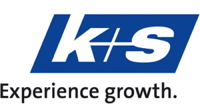 The salt and fertiliser manufacturer K+S has further strengthened its position with another acquisition. For a euro amount in the low double-digit millions range the company is acquiring the activities of Huludao Magpower Fertilizers Co., Ltd. The Kassel-based company, which last year fended off a hostile bid from its Canadian rival Potash, recently spoke of an "important step in our expansion into Asia". According to K+S, Magpower is among the leading manufacturers of synthetic magnesium sulphate (SMS), which is used as a fertiliser for oil palms, and soybeans.
The salt and fertiliser manufacturer K+S has further strengthened its position with another acquisition. For a euro amount in the low double-digit millions range the company is acquiring the activities of Huludao Magpower Fertilizers Co., Ltd. The Kassel-based company, which last year fended off a hostile bid from its Canadian rival Potash, recently spoke of an "important step in our expansion into Asia". According to K+S, Magpower is among the leading manufacturers of synthetic magnesium sulphate (SMS), which is used as a fertiliser for oil palms, and soybeans.
Infineon goes shopping again
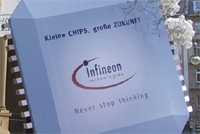 Germany's largest semi-conductor manufacturer has further strengthened its position in the US, with CEO Reinhard Ploss agreeing to pay USD 850 million – approximately EUR 765 million – for its rival Wolfspeed Power. Wolfspeed Power is currently owned by the LED producer Cree. "The business activities and know-how of Wolfspeed and Infineon are highly complementary," said Ploss in July. Both companies produce power management chips. This is not the first time that Ploss has gone shopping on the other side of the pond. Infineon will fund the deal with bank financing of USD 720 million. In the twelve months to the end of March 2016 Wolfspeed generated revenues of USD 173 million (EUR 155 million), Infineon disclosed recently. For comparison purposes: Infineon posted first quarter revenue of EUR 1.6 billion. In a press release, Infineon said that the transaction would be immediately accretive to the company's margin and adjusted earnings-per-share. The deal is expected to be closed by the end of 2016.
Germany's largest semi-conductor manufacturer has further strengthened its position in the US, with CEO Reinhard Ploss agreeing to pay USD 850 million – approximately EUR 765 million – for its rival Wolfspeed Power. Wolfspeed Power is currently owned by the LED producer Cree. "The business activities and know-how of Wolfspeed and Infineon are highly complementary," said Ploss in July. Both companies produce power management chips. This is not the first time that Ploss has gone shopping on the other side of the pond. Infineon will fund the deal with bank financing of USD 720 million. In the twelve months to the end of March 2016 Wolfspeed generated revenues of USD 173 million (EUR 155 million), Infineon disclosed recently. For comparison purposes: Infineon posted first quarter revenue of EUR 1.6 billion. In a press release, Infineon said that the transaction would be immediately accretive to the company's margin and adjusted earnings-per-share. The deal is expected to be closed by the end of 2016.
















 VOLKSWAGEN
VOLKSWAGEN